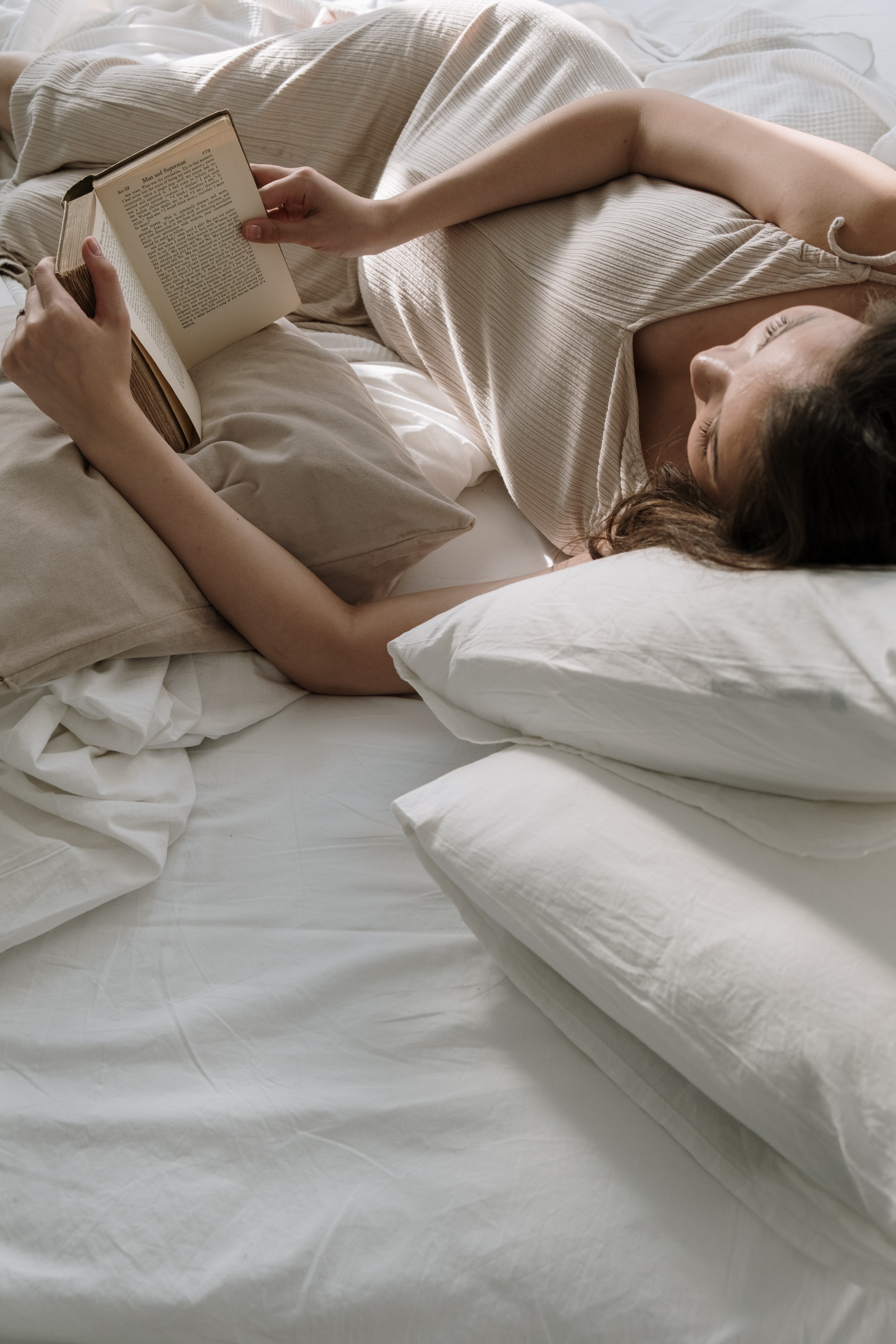
How Sleep Impacts Your Health
It’s no secret getting enough sleep is essential for a long-term overall health and well-being. However, those of us who struggle to fall and stay asleep, already know that, and those who chased increasingly fast paced world we live in prioritize work and other activities. Let’s discuss how sleep impacts our health and why it’s so important to (find a way) to sleep.
Why sleep?
First, it helps our body repair and regenerate cells. During sleep, our body produces cytokines, which are proteins that help fight off infection, inflammation, and stress. Then, sleep, helps boost, or immune system, which helps fight off infections and diseases. Getting enough sleep, also improve our memory and cognitive function, which can help us be more productive and focus during the day.
More than 1 in 3 Americans are sleep deprived.

Everyone knows not getting enough sleep can have negative effects on our health. Chronic sleep deprivation has been linked to an increased risk of developing conditions, such as obesity, diabetes, heart, disease, and stroke. Lack of sleep, can also lead to decrease cognitive function, irritability, and mood swings. An extreme cases sleep deprivation can even lead to hallucinations and psychosis
Here are some signs that you’re not getting enough sleep:
- Feeling tired during the day: if you find yourself, feeling, groggy or sleepy, throughout the day, this could be a sign that you’re not getting enough sleep. Even if you manage to stay awake, you may still feel like you’re in a fog, or have trouble focusing.
- Difficulty concentrating: sleep plays an important role in cognitive function. And when you don’t get enough of it, or ability to concentrate and remember things can suffer. You may find yourself struggling to focus on task or forgetting important details.
- Mood swings: when we’re sleep, deprived, or emotions can become harder to regulate. This can cause us to feel irritable, moody or anxious, and may make it harder to interact with others.
- Increased appetite and food cravings: lack of sleep can disrupt the hormones that regulate are appetite, leading to increased hunger and cravings for unhealthy foods. This can lead to weight gain, and other health problems over time.
- Difficulty making decisions: sleep is critical for decision-making and problem-solving, and when we don’t get enough of it, our ability to make good choices can suffer. You may find yourself struggling to make decisions or feeling indecisive.
- Reduced reaction: lack of sleep, can also affect a reaction time, making it harder to respond quickly or accurately to things happening around us. This can be specifically dangerous than driving or operating heavy machinery.
- Weakened immune system sleep is important for a healthy immune system, and when we don’t get enough of it, or ability to fight off infections and illnesses can suffer, you may find yourself getting sick more often, or taking longer to recover from illnesses.
- Increased risk of accidents or injuries. Finally, lack of sleep, can increase our risk of accidents or injuries, as it can affect our coordination, balance, and reaction time this can be especially problematic in certain professions or activities, such as driving or operating heavy machinery.
The relationship between sleep and mental health
In addition to the physical health benefits of sleep, getting enough, rest is also important for a mental health studies have shown that lack of sleep can lead to anxiety, depression, and other mood disorders. Sleep is also essential for emotional regulation, meaning that when we don’t get enough sleep, we may be more likely to experience emotional outburst or have difficulty managing our emotions. On the other hand, getting enough sleep, can help improve your mood, and overall well-being. When we are well rested, we are more likely to feel positive emotions and have a better outlook on life. This can lead to better relationships with others and improved overall quality of life.
The impact of technology on sleep
One of the biggest challenges to getting enough sleep is the prevalence of technology in our modern age. Many of us spend hours each day, looking at screens whether it be for work or leisure activities this can have a negative impact on our sleep quality, as the blue light emitted by screens, can interfere with our natural sleep, wake cycle the best way to combat. This is to establish a technology free. Before bed does convene turning off all screens, at least an hour before bedtime, or even removing electronics from bedroom all together instead read a book or practice relaxation techniques to help prepare your body and mind for sleep.
Tips for creating a sleep-friendly environment
Creating a sleep-friendly environment can help improve the quality of our sleep. Here are some things to consider.
- Keep the bedroom, cool quiet and dark a cool quiet and dark environment can help promote restful sleep
- Invest in a comfortable mattress and pillows to reduce discomfort and promote better sleep
- Use comfortable bedding to improve the quality of our sleep
- Avoid eating healthy meals before bed to avoid interference with sleep quality
- Use a lavender infused bed spray. Lavender has been shown to have a calming affect on my mind and body. You can help reduce anxiety, improve sleep, quality in permanently relaxation. You might also try drinking lavender tea to help you unwind after a long day remember taking care of your mental health it’s just important as taken care of your physical health.
- Establish a relaxing bedtime routine to help promote restful sleep. This can include taking a warm bath or practicing relaxation techniques
Follow a regular sleep schedule
One of the most important tips for a good sleep, is to follow a regular sleep schedule. Try to go to bed and wake up at the same time every day, even on weekends. This helps to regulate your body’s natural sleep wake cycle also known as the circadian rhythm, which can improve the quality of your sleep.
Practice Abhyanga
Abhyanga is an Ayurvedic practice of self-massage using warm oil, massaging your body with warm oil before bed can help promote relaxation and improve circulation and sooth, your nervous system. You can use a variety of oils such as sesame, coconut or almond oil, depending on your body type and personal preference.
Avoid stimulating foods and beverages
Certain foods and beverages can interfere with your sleep and should be avoided in the evening. This includes caffeine and alcohol spicy or heavy foods, and food side, and inCertain foods and beverages can interfere with your sleep and should be avoided in the evening. This includes caffeine and alcohol spicy or heavy foods, and foods high in sugar or refined carbohydrates. Instead up for lighter easily, digestible meals and herbal teas, such as chamomile or lavender tea, which can promote relaxation.
Practice Pranayama
Pranayama, or yogic breathing exercises, can help to calm your mind and promote relaxation. One simple exercise that you can do before bed is the 4-7-8 breathing technique in Hill threee The nose for a counter for hold your breath for town of seven and exhale through your mouth for a count of a repeat this cycle, several times, focusing on your breath, and letting go of any tensioner stress

Conclusion
Getting enough sleep is essential for both our physical and mental health. By prioritizing rest and creating an environment that promotes sleep, we can reap the many benefits of a good night's sleep. Additionally, by reducing our use of technology before bed, we can improve our sleep quality and overall well-being. So next time you're thinking of staying up late to finish a project or binge watch a show, remember to take care of your health and happiness first!


